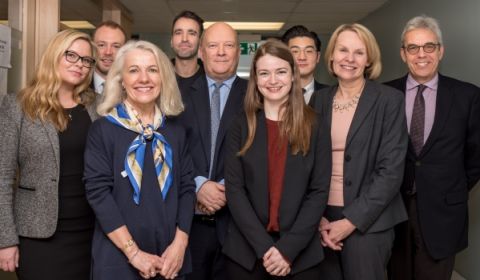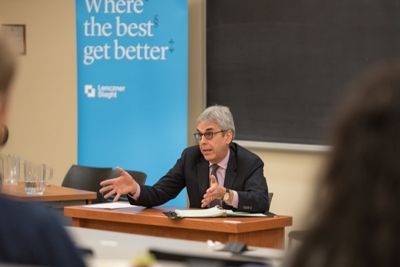

Moot season is in full swing and Queen’s Law students will soon be representing their school in provincial, national and international competitions. They’ll be heading out with lots of practical insight under their belts. At Moot Camp on January 12, alumni and friends from both sides of the bench helped students learn how to do advocacy.
This took place in two formats: panel discussions for mooters in all 17 competitions the school is entering this year and in breakout sessions for small groups.
“All of the panelists brought their varied experience to the table, and gave excellent advice on both effective and ineffective advocacy techniques,” says Megan Pfiffer, Law’19, an oralist for the Wilson Moot. “The breakout sessions provided mooters with an invaluable opportunity to receive practical feedback on how to best present an opening submission.”
Professor Chris Essert, the school’s Moot Court Committee Chair, introduced the experts:
- Peter Griffin, Law’77, managing partner, Lenczner Slaght Royce Smith Griffin LLP; chair, Queen’s Law Moot Advisory Council
- Justice Katherine van Rensburg, Ontario Court of Appeal; member, Queen’s Law Moot Advisory Council
- Justice Darla Wilson, Ontario Superior Court of Justice; member, Queen’s Law Moot Advisory Council
- Jon Chen, Law’12, associate, Lenczner Slaght
- James Holtom, Law’13, associate, McCarthy Tétrault LLP
- Laura Robinson, Law’14, associate, Lenczner Slaght
- Keith Smockum, managing partner, Smockum Zarnett
- Andrea Wheeler, Law’13, associate, Lenczner Slaght
Moot Camp focused on the role of an advocate and the importance of finding one’s own advocacy style. “The panelists warned against treating the bench as someone to do battle with or impress,” explains Megan Pfiffer, Law’19, a Wilson Moot team oralist. “Instead, they emphasized the importance of demonstrating your trustworthiness as an officer of the court and of leading the judges through a clear path towards your desired result. They also all attested to the importance of staying true to your own advocacy style, rather than trying to put on a character.”
For Ryan Wilson, Law’18, an oralist for the Bowman Tax Moot, a main lesson was that competitive moots require the same skills as real-life trial and appellant advocacy, making preparation key. “Hearing from lawyers and justices instilled within us the importance of practising these mooting skills now,” he says. “Moot Camp motivated us beyond the high goals we had already set for ourselves.”
Wilson also appreciated the “invaluable advice” given from different perspectives. “Justice Darla Wilson and Justice Katherine van Rensburg gave insight on what judges find persuasive, what they look for in a candid lawyer, and the categories of questions judges ask.” The litigators presented a holistic picture of advocating in court. “Peter Griffin’s advice on being yourself, followed by Keith Smockum on empowering the jury helped us prepare for our competitive moots in law school and for court trials when we are lawyers. Laura Robinson and James Holtom, both former successful mooters and now litigators, were able to speak of their experiences mooting, what they found worked, and what they wished they had known. Mr. Holtom also said we would receive a lot of conflicting advice, and learning which to take was a matter of deciding what works best for us.”
The Chair of the Queen’s Law Moot Advisory Council, who is also the winner of the 2017 Ontario Bar Association Award of Excellence in Civil Litigation, led Wilson’s breakout session. “Peter Griffin could not have been more kind with his time,” says Wilson. “He insisted on helping each and every one of us with our opening statement in the breakout session. After hearing our first attempts, he provided insightful advice and encouragement. His patience was reflected in his constant attention to each of us throughout many rounds of presenting.
“I can confidently say each of us improved our oral advocacy skills in that short hour and a half,” he adds.
That’s a sentiment shared by mooters in each of the small group sessions coached by the experts, says Megan Pfiffer. “We look forward to being able to implement their feedback while representing Queen’s Law in our moots.”
By Lisa Graham